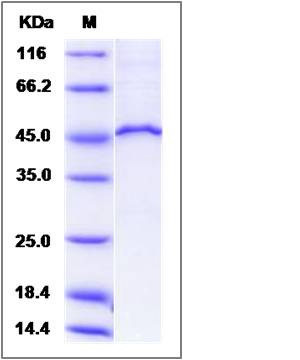Human MVK / Mevalonate kinase Protein (His & GST Tag)
LRBP,MK,MVLK,POROK3
- 100ug (NPP2354) Please inquiry
| Catalog Number | P13923-H20B |
|---|---|
| Organism Species | Human |
| Host | Baculovirus-Insect Cells |
| Synonyms | LRBP,MK,MVLK,POROK3 |
| Molecular Weight | The recombinant human MVK /GST chimera consists of 633 amino acids and has a calculated molecular mass of 70.2 kDa. The recombinant protein migrates approximately 47 kDa band in SDS-PAGE under reducing conditions. |
| predicted N | Met |
| SDS-PAGE |  |
| Purity | > 90 % as determined by SDS-PAGE |
| Protein Construction | A DNA sequence encoding the human MVK (Q03426) (Met1-Leu396) was fused with the N-terminal polyhistidine-tagged GST tag at the N-terminus. |
| Bio-activity | Kinase activity untested |
| Research Area | Immunology |Signal Transduction |Metabolism |Types of disease |Metabolism in Cancer |
| Formulation | Supplied as sterile 20mM Tris, 500mM NaCl, 2mM DTT, pH 7.4, 10% gly 1. Normally 5 % - 8 % trehalose and mannitol are added as protectants before lyophilization. Specific concentrations are included in the hardcopy of COA. |
| Background | Mevalonate kinase belongs to the GHMP kinase family, Mevalonate kinase subfamily. It can be found in a wide variety of organisms from bacteria to mammals. Mevalonate kinase may be a regulatory site in cholesterol biosynthetic pathway. Defects in mevalonate kinase can cause mevalonic aciduria (MEVA). It is an accumulation of mevalonic acid which causes a variety of symptoms such as psychomotor retardation, dysmorphic features, cataracts, hepatosplenomegaly, lymphadenopathy, anemia, hypotonia, myopathy, and ataxia. Defects in mevalonate kinase can also cause hyperimmunoglobulinemia D and periodic fever syndrome (HIDS). HIDS is an autosomal recessive disease characterized by recurrent episodes of unexplained high fever associated with skin rash, diarrhea, adenopathy (swollen, tender lymph nodes), athralgias and/or arthritis. |
| Reference |
